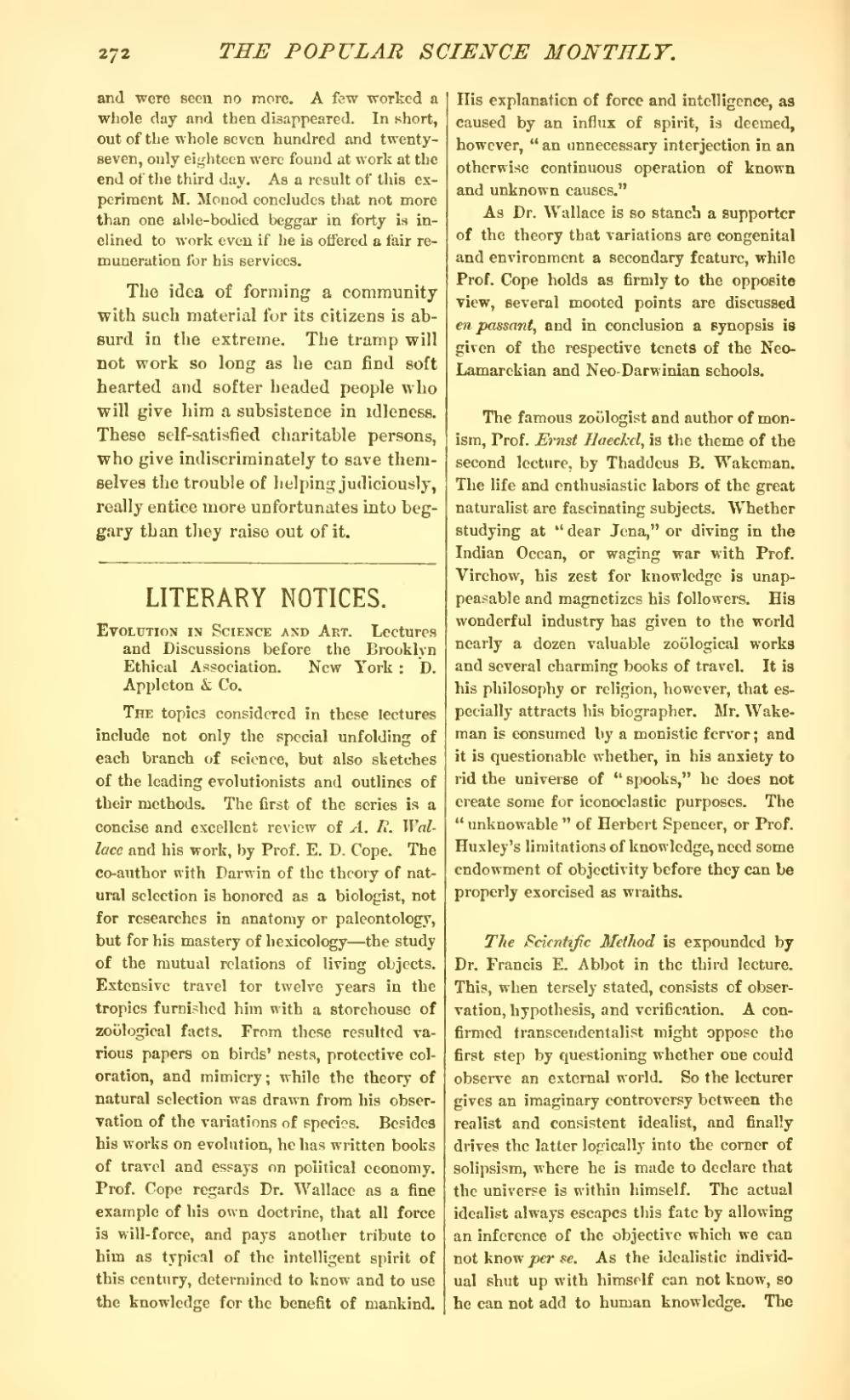The idea of forming a community with such material for its citizens is absurd in the extreme. The tramp will not work so long as he can find soft hearted and softer headed people who will give him a subsistence in idleness. These self-satisfied charitable persons, who give indiscriminately to save themselves the trouble of helping judiciously, really entice more unfortunates into beggary than they raise out of it.
Evolution in Science and Art. Lectures and Discussions before the Brooklyn Ethical Association. Now York: D. Appleton & Co.
The topics considered in these lectures include not only the special unfolding of each branch of science, but also sketches of the leading evolutionists and outlines of their methods. The first of the series is a concise and excellent review of A. R. Wallace and his work, by Prof. E. D. Cope. The co-author with Darwin of the theory of natural selection is honored as a biologist, not for researches in anatomy or paleontology, but for his mastery of hexicology—the study of the mutual relations of living objects. Extensive travel for twelve years in the tropics furnished him with a storehouse of zoölogical facts. From these resulted various papers on birds' nests, protective coloration, and mimicry; while the theory of natural selection was drawn from his observation of the variations of species. Besides his works on evolution, he has written books of travel and essays on political economy. Prof. Cope regards Dr. Wallace as a fine example of his own doctrine, that all force is will-force, and pays another tribute to him as typical of the intelligent spirit of this century, determined to know and to use the knowledge for the benefit of mankind. His explanation of force and intelligence, as caused by an influx of spirit, is deemed, however, "an unnecessary interjection in an otherwise continuous operation of known and unknown causes."
As Dr. Wallace is so stanch a supporter of the theory that variations are congenital and environment a secondary feature, while Prof. Cope holds as firmly to the opposite view, several mooted points are discussed en passant, and in conclusion a synopsis is given of the respective tenets of the Neo-Lamarckian and Neo-Darwinian schools.
The famous zoölogist and author of monism. Prof. Ernst Haeckel, is the theme of the second lecture, by Thaddeus B. Wakeman. The life and enthusiastic labors of the great naturalist are fascinating subjects. Whether studying at "dear Jena," or diving in the Indian Ocean, or waging war with Prof. Virchow, his zest for knowledge is unappeasable and magnetizes his followers. His wonderful industry has given to the world nearly a dozen valuable zoölogical works and several charming books of travel. It is his philosophy or religion, however, that especially attracts his biographer. Mr. Wakeman is consumed by a monistic fervor; and it is questionable whether, in his anxiety to rid the universe of "spooks," he does not create some for iconoclastic purposes. The "unknowable" of Herbert Spencer, or Prof. Huxley's limitations of knowledge, need some endowment of objectivity before they can be properly exorcised as wraiths.
The Scientific Method is expounded by Dr. Francis E. Abbot in the third lecture. This, when tersely stated, consists of observation, hypothesis, and verification. A confirmed transcendentalist might oppose the first step by questioning whether one could observe an external world. So the lecturer gives an imaginary controversy between the realist and consistent idealist, and finally drives the latter logically into the corner of solipsism, where he is made to declare that the universe is within himself. The actual idealist always escapes this fate by allowing an inference of the objective which we can not know per se. As the idealistic individual shut up with himself can not know, so he can not add to human knowledge. The
